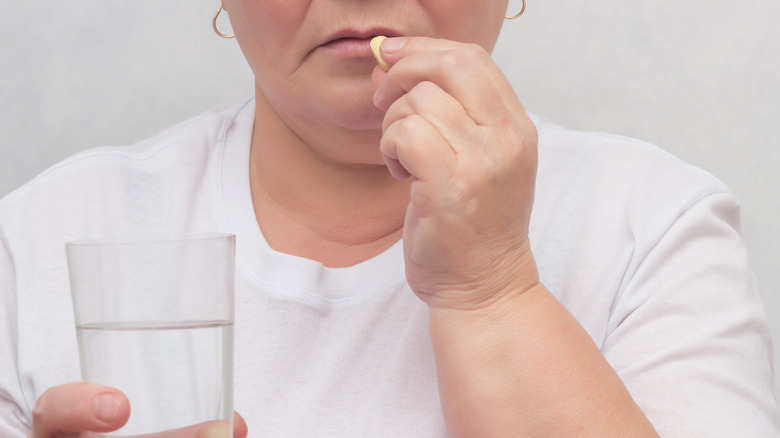Gigi Hadid's Hashimoto's Disease Explained
In recent years, more celebrities have been getting real about the chronic health conditions that they suffer from. Doing so has been an effort to raise awareness about different chronic diseases that many people deal with on a daily basis, or to help educate the public, particularly body shamers, on how different diseases affect the body. Chronic disease or not, we could all benefit from a little more kindness online.
One of those celebrities who publicly addressed their health condition was Gigi Hadid, who announced in 2018 that she had recently been diagnosed with Hashimoto's disease, which had caused her body to change. As a model, her weight and overall body type are often under speculation, but by addressing the changes that her body had gone through because of chronic disease, we learned a lesson in not judging people so quickly based on their appearance. You never know what's going on with someone's health that may cause their appearance to change.
What is Hashimoto's disease?
Hashimoto's disease is a fairly common autoimmune disorder that causes your thyroid to be underactive, which is known as hypothyroidism. This means your thyroid doesn't produce enough hormones, which causes your body's immune system to attack its own thyroid, causing it to become inflamed (via NIDDK).
If you've been to the doctor recently, you most likely had your thyroid checked while you were there. The thyroid is located in your neck and can become inflamed for a variety of different reasons, not just Hashimoto's disease. The hormones that the thyroid produces affect almost every organ system in your body, like the heart, brain, and muscles, which is why it's important to know if your thyroid is functioning properly (via NIDDK).
As with many other autoimmune disorders, Hashimoto's disease is more common in women, specifically middle-aged women, although it can be diagnosed at any age in men as well (via American Thyroid Association). Hashimoto's disease can also be hereditary, so if someone in your family has the disease, there is a higher chance that you will.
What are the symptoms of Hashimoto's disease?
Hashimoto's disease can sometimes be difficult to diagnose because the symptoms caused by hypothyroidism may not be very noticeable at first. It's also important to note that the most noticeable symptoms that arise are not unique to Hashimoto's disease, and can be attributed to a lot of different conditions that affect your thyroid (via Mayo Clinic).
Some more noticeable symptoms that might signal there is something wrong with your thyroid are an enlarged thyroid, weight gain, fatigue, increased sensitivity to the cold, muscle weakness, constipation, or hair loss (via Mayo Clinic). Again, these are all symptoms of hypothyroidism, which is an effect of Hashimoto's disease, but these symptoms aren't only attributed with Hashimoto's.
Diagnosing Hashimoto's disease most often includes getting blood work done. Like we mentioned above, Hashimoto's is an autoimmune disorder, and therefore the body's immune system creates antibodies that attack the thyroid. The antibodies that are associated with people who have Hashimoto's disease are called thyroid peroxidase antibodies (TPO), which will show up in a blood panel and let your doctor know that you most likely have Hashimoto's disease (via NIDDK).
Your doctor will also most likely check your TSH level, which is the thyroid stimulating hormone. Both of these tests together will give them a pretty good idea of what your diagnosis is.
Can you do anything to prevent Hashimoto's disease?
The specific mechanics of why many autoimmune disorders, like Hashimoto's disease, happen are still unclear to doctors and scientists, so right now there isn't anything specific you can do to stop yourself from getting Hashimoto's disease (via Healthline). If you know that there is someone in your family that has Hashimoto's sisease, you can let your doctor know so they can do appropriate blood tests earlier on.
Early diagnosis, before you start to get any kind of symptoms, can help keep the quality of your life at a high level. Some of the symptoms of Hashimoto's disease can be quite uncomfortable, but if you know that you have it, you and your doctor can monitor your thyroid function to make sure that any symptoms that might come up don't go untreated and cause any further complications down the road.
Although Hashimoto's disease is very manageable, if it's left untreated, the hypothyroidism caused by Hashimoto's can cause more serious problems like depression, heart problems, or myxedema coma, which requires immediate hospitalization (via Cleveland Clinic).
How do you treat Hashimoto's disease?
It may be the case that you have regular bloodwork done with your doctor and the TPO antibodies are identified before you even have any symptoms associated with hypothyroidism. If this is the case, your doctor may just wait and see if any adverse symptoms start to develop (via NIDDK). Just because your body is producing these antibodies doesn't necessarily mean that your thyroid isn't functioning properly or that there is something wrong with you.
If you do have symptoms, and your doctor has determined that hypothyroidism is to blame, you will most likely be started on a hormone replacement to supplement the hormones that your body's thyroid is failing to produce. The most common medication for this is levothyroxine (American Thyroid Association). You may have to have more regular TSH bloodwork done to ensure that you're on the proper dose of levothyroxine, and once you are, you can continue taking the medication long-term with little to no side effects.
Is Hashimoto's disease curable?
Not everyone who is diagnosed with Hashimoto's disease will require treatment, and some people's symptoms might be so mild that they don't notice a big change in their quality of life. However, since Hashimoto's affects everyone differently, it's important to create an individualized treatment plan with your doctor if your symptoms do start to become more intrusive in your life.
If your doctor decides that a hormone-replacing medication is the best course of action for your hypothyroidism symptoms, you will most likely have to be on the medication for the rest of your life. Getting off of your levothyroxine will cause your TSH levels to return to where they were before getting them under control with medication (via Cleveland Clinic).
Following the individualized plan that your doctor recommends for your Hashimoto's disease will allow you to keep your symptoms well controlled, and they may also recommend other health and lifestyle choices to reduce inflammation and keep symptoms more manageable.
Hashimoto's disease is similar to many autoimmune diseases in that there is no known cure for it. Many are treatable once they are diagnosed, but they never completely go away, so people that are diagnosed with Hashimoto's disease or other autoimmune diseases will have to manage symptoms for the rest of their lives. The good news is that Hashimoto's disease is very treatable compared to other conditions, and people who have it can continue to live long full lives.






